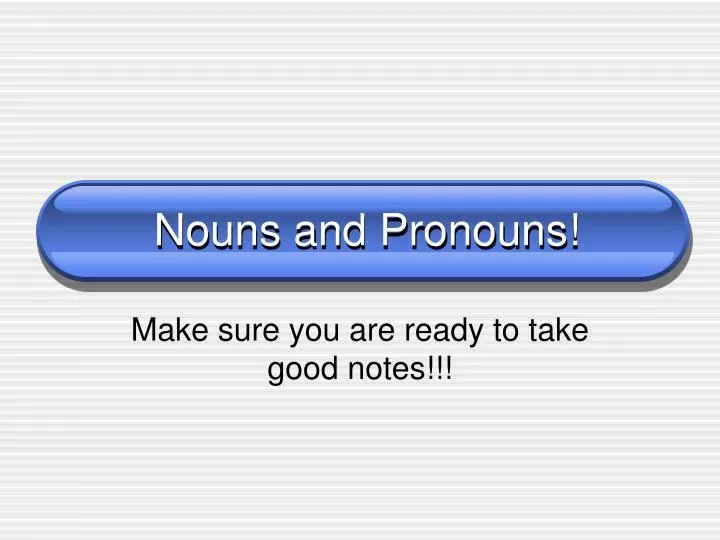

Nouns and Pronouns!
Sep 16, 2014
390 likes | 1.19k Views
Nouns and Pronouns!. Make sure you are ready to take good notes!!!. Nouns. A noun is the name of a person, place, or thing. Nouns name things that can be seen and touched as well as those that can not be seen and touched. Examples. Exercise A.
Share Presentation
- proper noun
- intensive pronouns
- personal pronouns
- reflexive intensive pronouns
- demonstrative pronouns direct attention

Presentation Transcript
Nouns and Pronouns! Make sure you are ready to take good notes!!!
Nouns • A noun is the name of a person, place, or thing. • Nouns name things that can be seen and touched as well as those that can not be seen and touched.
Exercise A • Write the two nouns in each group. Then label each pair as people, places, or things. • able, baby, musician • rabbit, really, chair • prison, mountainside, write • misery, rusty, success • only, forest, swamp
Exercise A; continued • sailor, tiny, explorer • tame, table, dog • destroy, dentist, mayor • rock, clever, pie • beach, pasture, foolish • carry, courage, freedom • lion, kindly, kite • conductor, woman, do
Exercise A; continued • grim, king, president • bedroom, school, rough • jolly, desk, thought • construction, pain, pretty • hunter, nurse, into • pelican, shouted, honor • pizza, library, ill
Compound Nouns • A compound noun is a noun that is made up of more than one word. • Compound nouns can be: • Separated - bubble bath, station wagon • Hyphenated - son-in-law, hand-me-down • Combined - shipwreck, handstand
Exercise B • Read the paragraphs on the next slide and write down all the compound nouns you see.
As soon as she arrived at the airport, Jane became excited about her first flight alone. Once the ticket agent had given her a boarding pass, she kissed her parents, went on board, and fastened her seatbelt. Shortly after takeoff, the flight attendant brought her a soft drink. Later the passengers lunched on meatloaf, string beans, and fruit salad. Soon she heard the landing gear come down and returned her tray-table to its correct position. In a few minutes, she felt the gentle bump of touch-down. Inside the terminal, next to the runway, her grandmother and grandfather were waiting for her. A slight mix-up over her suitcase was soon solved. With the help of a porter, they carried the luggage to the station wagon. Jane couldn’t believe her luck as she watched the beautiful scenery along the freeway on the way into town.
Common Nouns • A common noun names any one of a class of people, places, or things. • Examples: • country • building • school • writer
Proper Nouns • A proper noun names a specific person, place, or thing. • Examples: • Kenya • White House • Waverly High School • Emily Dickinson • Orlando Bloom
Exercise C • Write the proper noun in each group. Add the necessary capitalization. • town, village, smithville • black beauty, horse, pony • state, region, texas • river, nile, stream • landmark, memorial, washington monument
Exercise C; continued • whitman, poet, writer • french, people, language • dog, puppy, lassie • paris, capital, city • country, nation, italy
Exercise D • Write sentences that fit the following criteria: • Write a sentence about sports that includes one proper noun and one compound noun. • Write a sentence about animals that includes two common nouns. • Write a sentence about an interesting place that includes one compound proper noun and one proper noun. • Write a sentence about your school that contains one compound proper noun and one proper noun. • Write a sentence about music that includes one compound proper noun and two common nouns.
STOP!!! Review the different types of nouns with a partner.
Pronouns • Pronouns are words that stand for nouns or words that take the place of nouns. • Pronouns have antecedents • An antecedent is a noun for which a pronoun stands. • In other words, antecedents are nouns that pronouns replace.
Examples • Joe ate his whole pepperoni pizza! • Joe ate his whole pepperoni pizza! • When Angie moved, she gave her cat to the neighbors. • When Angie moved, she gave her cat to the neighbors. • Caring for bees can be rewarding, but it requires a certain amount of bravery. • Caring for bees can be rewarding, but it requires a certain amount of bravery.
More Examples • Because of its climate, Phoenix is my favorite city. • Because of its climate, Phoenix is my favorite city. • All of my answers are correct. • All of my answers are correct.
Exercise A • Write the antecedent of each underlined pronoun. • Some of the children are afraid of mice. • Andrea usually brings her lunch to school. • This is not the record I ordered. • The horse has broken out of its stall. • Frank asked his father to help build a fire. • The explorers loaded supplies into their boat. • The Smiths enjoyed themselves at the picnic. • Did Joe bring his camera? • The boat with the red sail is the one that won. • The twins ordered milkshakes with their lunches.
Personal Pronouns • Personal pronouns refer to: • The person speaking • The person spoken to • The person, place, or thing spoken about.
Personal Pronoun
Exercise B • Write each sentence underlining the two personal pronouns in each. Then draw a line from each personal pronoun to its antecedent. • Alice asked Henry if he had brought his bike. • Paul baked his parents a cake for their party. • The twins took their skis with them. • Jody put down her pencil when she was finished. • Dad helped the Grants select their new piano and move it into the house. • The fans rose to their feet when they realized the ball had gone over the fence.
Exercise B; continued • The movie doesn’t live up to its ads, but it does have an exciting ending. • Tracy enjoyed her trip and was sorry it was over. • Ned decided he would order cake since it looked so delicious. • Ellen helped her brother finish his algebra homework.
Pronouns with -self or -selves • Pronouns that end with -self or -selves come in two categories: • Reflexive or • Intensive
Reflexive & Intensive Pronouns
Reflexive Pronouns Add information to the sentence by pointing back to a noun or pronoun earlier in the sentence. Example: Joy helped herself to some pizza. Intensive Pronouns Simply adds emphasis to a noun or pronoun in the same sentence. Example: The mayor herself attended the meeting. Reflexive vs. Intensive
Exercise C • Write the reflexive or intensive pronoun in each sentence and label each as Int. (intensive) or Ref. (reflexive). • I myself have never questioned Jane’s loyalty. • We all enjoyed ourselves at the picnic. • The author described the plot to us herself. • Helen wallpapered her bedroom herself. • The governor himself answered our questions. • Paul kept telling himself he wasn’t afraid. • The children went to the park by themselves.
Exercise C; continued • The guests helped themselves from heaping platters. • Pete had a hard time defending himself. • Rita found herself the only one left.
Demonstrative, Relative, and Interrogative • Demonstrative pronouns direct attention to specific people, places, or things. • Relative pronouns begin subordinate clauses and connect them to another idea in the sentence. • Interrogative pronouns begin questions.
Demonstrative, Relative, and Interrogative
Exercise D • Write the pronoun in each sentence. Then label each as demonstrative, relative, or interrogative. • Which of the candidates is more likely to win? • Ralph was the person who told Lisa. • What will happen next? • This book is by the same author. • Who was elected to represent the class? • Jake has a pen pal who lives in New Guinea. • Is that the jacket with the broken zipper? • What is Paul having for dinner? • Darryl’s aunt is the lawyer who won the case. • These are the tomatoes from Mom’s garden.
Indefinite Pronouns • Indefinite pronouns refer to people, places, or things, often without specifying which ones.
Indefinite Pronouns
Exercise E • Write the indefinite pronouns in the paragraph. • Although animals throughout the animal kingdom are adaptable, none have shown greater ability to adapt than insects. Everyone knows that insects thrive in hot and humid jungle regions, but did you know that some also live in frozen polar regions? Deserts, caves, lakes, and mountains provide homes for still others. Few, however, are found in the earth’s oceans. Scientists have already identified more of these small creatures than the average person would guess - over 800,000 kinds.
Exercise E; continued • Write the indefinite pronouns in the paragraph. • No one is sure, but it seems likely that many remain to be discovered. Some of the scientists who study insects estimate that there may be up to ten million kinds still to be identified. All have up to six legs, three main body parts, and an external skeleton. One has a wingspan of about ten inches; another about one-hundredth of an inch. Their great numbers and variety seem to have equipped insects with the ability to survive anything.
Although animals throughout the animal kingdom are adaptable, none have shown greater ability to adapt than insects. Everyone knows that insects thrive in hot and humid jungle regions, but did you know that some also live in frozen polar regions? Deserts, caves, lakes, and mountains provide homes for still others. Few, however, are found in the earth’s oceans. Scientists have already identified more of these small creatures than the average person would guess - over 800,000 kinds.
No one is sure, but it seems likely that many remain to be discovered. Some of the scientists who study insects estimate that there may be up to ten million kinds still to be identified. All have up to six legs, three main body parts, and an external skeleton. One has a wingspan of about ten inches; another about one-hundredth of an inch. Their great numbers and variety seem to have equipped insects with the ability to survive anything.
- More by User
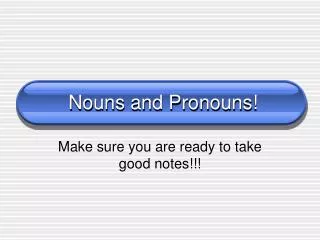
13.03k views • 38 slides
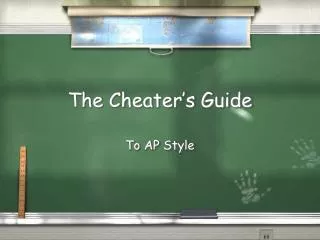
The Cheater’s Guide
The Cheater’s Guide To AP Style Capitals Proper nouns Capitals Proper nouns “Real” titles directly before names Capitals Proper nouns “Real” titles directly before names Regions Legislative bodies: Council, Assembly Capital Don’ts
1.96k views • 43 slides
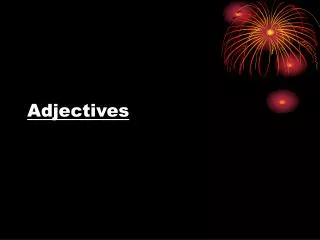
Adjectives . Adjectives usually come before nouns, not after them. They modify nouns and pronouns . A big house. They answer the questions Which one? How many? What kind?. Adjectives are always singular. Never add –s to an adjective and never use a plural word as an adjective.
1.16k views • 26 slides
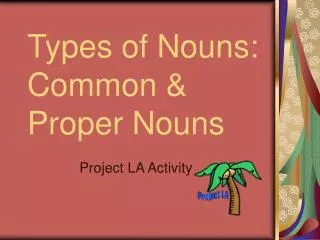
Types of Nouns: Common & Proper Nouns
Types of Nouns: Common & Proper Nouns. Project LA Activity. Common Nouns . Common Nouns are any person, place, or thing. Common nouns are not capitalized. The city A policeman That newspaper. Proper Nouns .
4.37k views • 24 slides
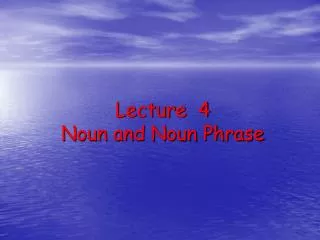
Lecture 4 Noun and Noun Phrase
Lecture 4 Noun and Noun Phrase. Teaching Contents. 4.1 Classification of nouns and function of noun phrases 4.2 Number forms of nouns 4.3 Partitives. 4.1 Classification of nouns and function of noun phrases. 1) Classification of nouns
1.03k views • 24 slides
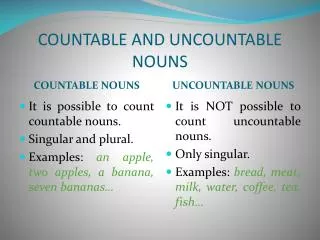
COUNTABLE AND UNCOUNTABLE NOUNS
COUNTABLE AND UNCOUNTABLE NOUNS. COUNTABLE NOUNS. UNCOUNTABLE NOUNS. It is possible to count countable nouns. Singular and plural. Examples: an apple, two apples, a banana, seven bananas…. It is NOT possible to count uncountable nouns. Only singular.
3.74k views • 4 slides
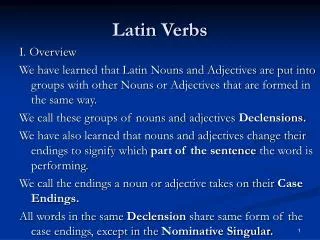
Latin Verbs
Latin Verbs. I. Overview We have learned that Latin Nouns and Adjectives are put into groups with other Nouns or Adjectives that are formed in the same way. We call these groups of nouns and adjectives Declensions.
1.54k views • 81 slides
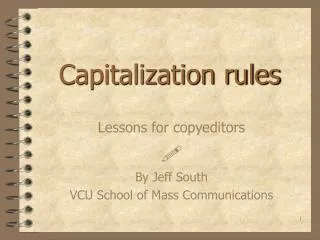
Capitalization rules
Capitalization rules. Lessons for copyeditors By Jeff South VCU School of Mass Communications. In general. ‘Down style’ It’s faster. Blame cheap publishers! When in doubt, check the AP Stylebook. Proper vs. common nouns. Proper nouns = specific people, places, things
880 views • 56 slides
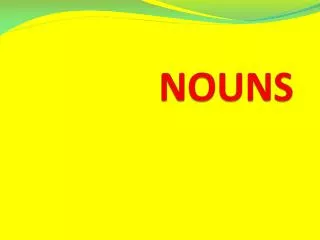
NOUNS. What is a noun ?. What is a noun ?. A noun is a word we use to name people , places and things . There are six kinds of noun in English. There are six kinds of noun in English. Common nouns : dog , man , table . There are six kinds of noun in English.
2.14k views • 67 slides

Noun. Definition of nouns. Semantic properties. Semantic properties . Nouns are described as words that refer to a person , place , thing , event , substance , quality , quantity , idea etc. Classification of nouns: Proper nouns and common nouns Countable and uncountable nouns
1.13k views • 63 slides

PUNTO DE GRAMÁTICA
PUNTO DE GRAMÁTICA. Nouns. Page 110. NOUNS. Nouns refer to people, animals, places, and things. NOUNS. In Spanish, nouns have gender. They are either masculine or feminine. Masculine / Feminine. Most nouns that end in -o and -ma are masculine. Masculine / Feminine.
754 views • 64 slides
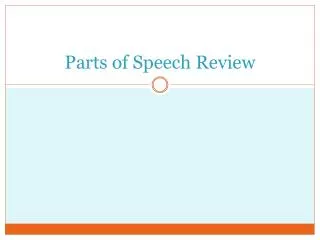
Parts of Speech Review
Parts of Speech Review. Nouns. Take notes in the Grammar section of your binder. Nouns. A word or word group that is used to name a person , a place , a thing , or an idea. Compound Nouns. 2 words for the price of 1 One word: grand father , base ball , foot ball
765 views • 63 slides
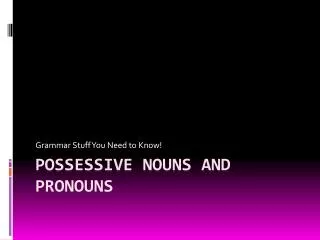
Possessive Nouns and Pronouns
Grammar Stuff You Need to Know! . Possessive Nouns and Pronouns. What’s the deal?. Possessive nouns and pronouns demonstrate OWNERSHIP . Plural nouns indicate MORE THAN ONE person, place or thing. How do I recognize POSSESSIVES?.
927 views • 8 slides
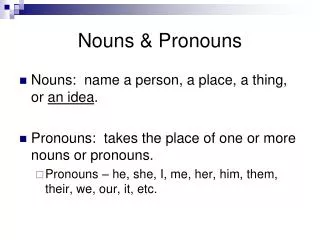

Nouns & Pronouns
Nouns & Pronouns. Nouns: name a person, a place, a thing, or an idea . Pronouns: takes the place of one or more nouns or pronouns. Pronouns – he, she, I, me, her, him, them, their, we, our, it, etc. Nouns. Concrete Noun: something you can see, touch, taste, hear, or smell.
1.52k views • 8 slides
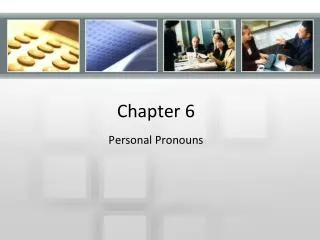
Chapter 6. Personal Pronouns. Personal Pronouns. Objectives Use personal pronouns correctly as subjects and objects. Distinguish between possessive pronouns (such as its ) and contractions (such as it’s ).
754 views • 54 slides
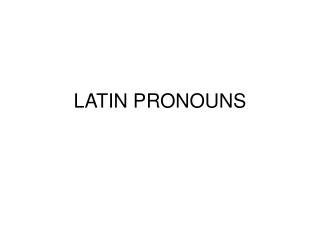
LATIN PRONOUNS
LATIN PRONOUNS. THE BASICS. Most pronouns can also be used as adjectives
1.09k views • 90 slides

Let’s Play. 3 rd Grade ELA Review. Subject / Verb and Adjectives. Nouns. Contractions. Pronouns. Spelling. Capitalization and Punctuation. Contractions. Subject/ Verb and Adjectives. Nouns. Pronouns. Spelling. Capitalization and Punctuation. 10. 10. 10. 10.
1.14k views • 74 slides
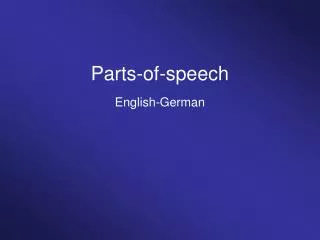
Parts-of-speech English-German
Parts-of-speech English-German. Nouns. nouns proper nouns common nouns count noun mass nouns concrete abstract concrete abstract Bill tree comment milk music. Nouns. (1) a. *the Peter b. der Peter. (2) a. *three Peters b. *drei Peters.
1.74k views • 116 slides
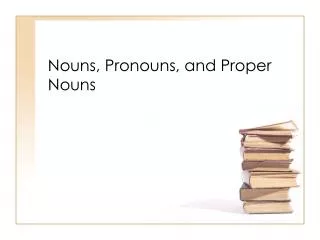
Nouns, Pronouns, and Proper Nouns
Nouns, Pronouns, and Proper Nouns. A noun is a person, place, or thing. These are examples of nouns:. person cat pencil school Marie ocean. game tree street park car mother. Can you name some other nouns?. Circle all of the nouns in each sentence.
1.65k views • 12 slides

English Language Arts Level 7 #6 - Ms. Walker
English Language Arts Level 7 #6 - Ms. Walker. Today ’ s Objectives. Assessment: Parts of Speech Sentence Building: Types of Sentences Idiom of the Day. Eight Parts of Speech. Pronouns. Nouns. Prepositions. Adverbs. Adjectives. Verbs. Conjunctions. Interjections. Word that names.
1.12k views • 79 slides
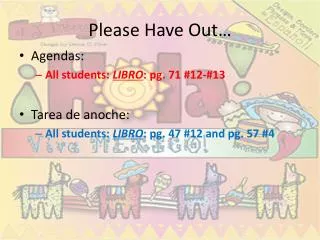
Please Have Out…
Please Have Out…. Agendas: All students: LIBRO : pg. 71 #12-#13 Tarea de anoche : All students: LIBRO : pg. 47 #12 and pg. 57 # 4. Midterm- ~ 5 00 points. Vocabulario / Cultura : Costa Rica and Argentina pg. 41 Direct Object Pronouns p . 46 Indirect Object Pronouns
948 views • 82 slides
- Preferences

Nouns and Pronouns - PowerPoint PPT Presentation

Nouns and Pronouns
Nouns and pronouns what is a noun common nouns are any person, place, or thing. common nouns are not capitalized. examples: the city that newspaper a policeman ... – powerpoint ppt presentation.
- Common nouns are any person, place, or thing. Common nouns are not capitalized.
- That newspaper
- A policeman
- A compound noun is a noun that is made up of more than one word.
- Compound nouns can be
- Separated - bubble bath, station wagon
- Hyphenated - son-in-law, hand-me-down
- Combined - shipwreck, handstand
- Proper nouns are the name of a special person, place, or thing. Proper nouns are capitalized.
- Mrs. Anderson
- LaVergne Middle School
- A possessive noun is a noun that names who or what has something.
- Add an apostrophe and s ('s) to form the possessive of most singular nouns.
- Add an apostrophe (') to form the possessive of plural nouns that end with s.
- Add an apostrophe and s ('s) to form the possessive of plural nouns that do not end with s.
- A pronoun is a substitute for a noun. It refers to a person, place, thing, feeling, or quality but does not refer to it by its name.
- The critique of Plato's Republic was written from a contemporary point of view. It was an in-depth analysis of Plato's opinions about possible governmental forms
- Personal pronouns refer to
- The person speaking
- The person spoken to
- The person, place, or thing spoken about.
- Reflective Refers to the subject and is necessary to the meaning of the sentence.
- Intensive Emphasizes a noun or another pronoun and is unnecessary to the meaning.
- Example Reflexive
- Tara enjoyed HERSELF at the party.
- The team prided THEMSELVES on their victory.
- I MYSELF cooked that delicious dinner.
- Did you redecorate the room YOURSELF?
- Demonstrative Points out a person, place, thing, or idea
- Interrogative Introduces a question.
- Indefinite refers to a person, place, thing, or an idea that might not be specifically named.
- Show ownership. Some are used alone some describe a noun.
- The person in the blue car is (my, mine, I, me) mother.
- (My, Mine, I, Me) am ashamed of myself for being so rude to her.
- He is not a good friend, but he is an acquaintance of (my, mine).
- My parents will not allow (my, mine, I, me) to spend the night with Pam.
- (My, Mine, I, Me) brother sits on a stool when he plays the piano.
- An antecedent is the word, phrase, or clause to which a pronoun refers, understood by the context.
- Antecedents are nouns that pronouns replace.
- Joe ate his whole pepperoni pizza!
- When Angie moved, she gave her cat to the neighbors.
- Caring for bees can be rewarding, but it requires a certain amount of bravery.
- A pronoun must agree with its antecedent in number, gender, and person.
- A singular pronoun must correspond to a singular antecedent
- The garbage man took away 25 more trash this holiday. He began dreaming of a green Christmas next year, one with less trash.
- A plural pronoun must refer to a plural antecedent.
- The garbage men worked hard. They wanted to go skiing in Colorado.
- Pronouns that refer to a male or female must refer to the correct gender.
- Fred drank milk before he ate dinner. Susan ate steak after she went home.
PowerShow.com is a leading presentation sharing website. It has millions of presentations already uploaded and available with 1,000s more being uploaded by its users every day. Whatever your area of interest, here you’ll be able to find and view presentations you’ll love and possibly download. And, best of all, it is completely free and easy to use.
You might even have a presentation you’d like to share with others. If so, just upload it to PowerShow.com. We’ll convert it to an HTML5 slideshow that includes all the media types you’ve already added: audio, video, music, pictures, animations and transition effects. Then you can share it with your target audience as well as PowerShow.com’s millions of monthly visitors. And, again, it’s all free.
About the Developers
PowerShow.com is brought to you by CrystalGraphics , the award-winning developer and market-leading publisher of rich-media enhancement products for presentations. Our product offerings include millions of PowerPoint templates, diagrams, animated 3D characters and more.


- My presentations
Auth with social network:
Download presentation
We think you have liked this presentation. If you wish to download it, please recommend it to your friends in any social system. Share buttons are a little bit lower. Thank you!
Presentation is loading. Please wait.
Introduction to Pronouns
Published by Melvyn Osborne Modified over 9 years ago
Similar presentations
Presentation on theme: "Introduction to Pronouns"— Presentation transcript:
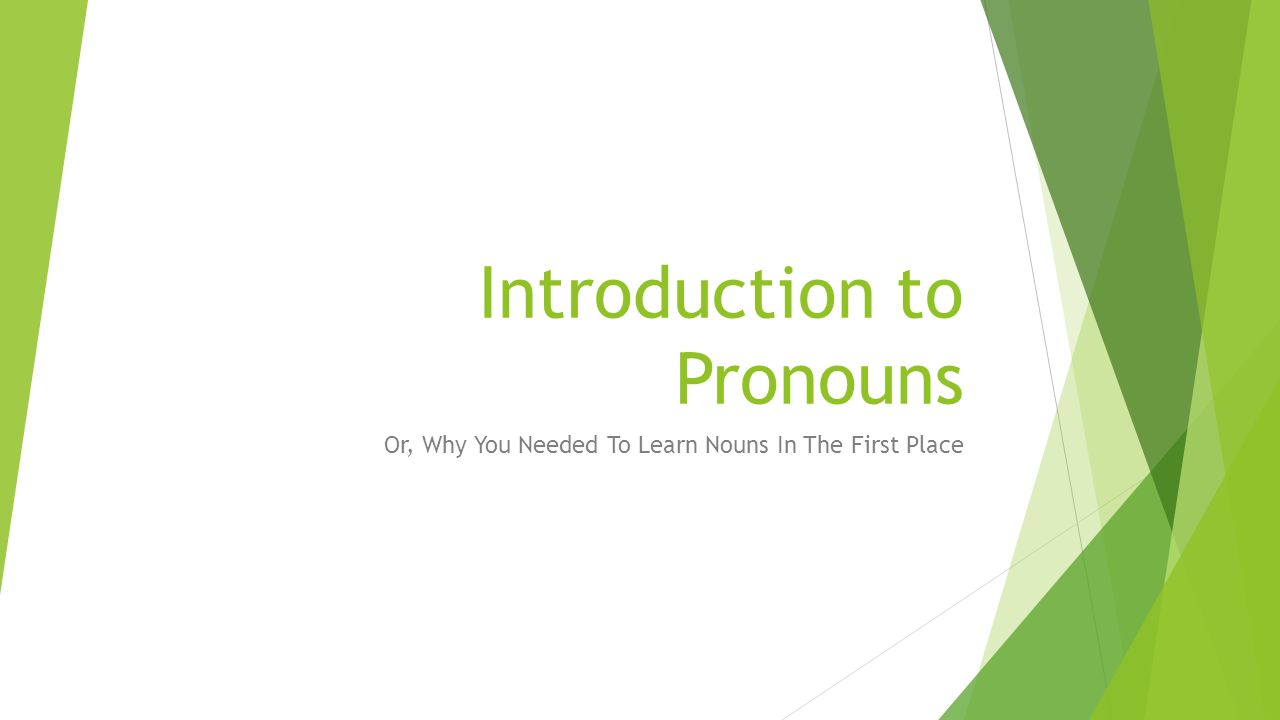
Mini-Lessons: Types of Pronouns

Rocking Pronouns Jeopardy

Parts of Speech: Pronoun With Help from Ralph Wiggum.

Pronouns. Let’s Recap Pronoun Case 1.Subjective 2.Objective 3.Possessive.

I Am So Proud of Myself! Reflexive and Intensive Pronouns 8 th Grade English Pronoun Unit.

Pronouns What are they?.

Which word is the antecedent in the sentence below? Jill said she would watch the show. A – said B- watch C- Jill D- show.

Personal and Possessive Pronouns

{ Pronouns My father shot the elephant wearing his pajamas.

Pronouns – Part One Grade Eight.

A pronoun is a word that takes the place of one or more nouns or pronouns. The word that the pronoun refers to is called the antecedent. There are.

Pronouns: subjective, objective and possessive case.

Mr. Loeb English II Kenwood Academy High School

English: Friday, November 30, Handouts: * Grammar #28 (Possessive Pronouns) 2.Homework: * Grammar #28 (Possessive Pronouns) * If you don’t finish.

Directions: Press F5 to begin the slide show. Press the enter key to view each part of the review.

Pronouns. What is a pronoun? A pronoun is a word used in place of a noun or another pronoun. Pronoun Video Pronoun Video.

PRONOUNS. Definition A pronoun is a word, like he, she, or who, that replaces a noun in a sentence. There are many types of pronouns, including: Personal.

Pronouns A pronoun is a word used in place of one noun or more than one noun. The noun replaced, or referred to, by the pronoun is called the pronoun’s.
About project
© 2024 SlidePlayer.com Inc. All rights reserved.

IMAGES
COMMENTS
Nouns and Pronouns. Nouns and Pronouns. Definitions. Noun —A noun is a word that names a person, object, idea, or place. Pronoun —A pronoun takes the place of a noun or another pronoun, saving the need to write the same word twice. Singular and Plural Nouns. 502 views • 17 slides
shows how a noun or pronoun relates to another part of the sentence; never stands alone - always found in a phrase EX: out, behind, into, over, under, above, around conjunction. connects individual words or groups of words; connects words, phrases, or clauses EX: and, but, or, because, although, since, when, after interjection
Nouns and Pronouns. Nouns and Pronouns. Nouns. A noun is a word that can describe a: Person - architect Place - neighborhood Thing - money Idea - courage. There are two basic kinds of nouns:. Common nouns Proper nouns. Common nouns. Common nouns name a person, place, thing, or idea. 391 views • 33 slides
Nouns and Pronouns!. Make sure you are ready to take good notes!!!. Nouns. A noun is the name of a person, place, or thing. Nouns name things that can be seen and touched as well as those that can not be seen and touched. Examples. Exercise A. Slideshow 4460399 by artie
15 Case: Objective Case If the pronoun is replacing a noun that is the object of a sentence, it is an OBJECT PRONOUN Me, you, him, her, them, us Miss Jones ... Download ppt "Nouns and Pronouns." Similar presentations . Slides: Types of Pronouns Antecedents Classes of Pronouns : Personal, Relative, Indefinite, Interrogative, Demonstrative. ...
Title: Nouns and Pronouns 1 Nouns and Pronouns. Nouns name people, places, and things. Pronouns substitute for nouns. 2 What kinds nouns are there? First, proper nouns name unique titles, persons, places, and organizations ; Dr. Monte teaches English at Dalton State College. Always capitalize the first letter of proper
Nouns and Pronouns What is a noun? Common nouns are any person, place, or thing. Common nouns are not capitalized. Examples: The city That newspaper A policeman ... - A free PowerPoint PPT presentation (displayed as an HTML5 slide show) on PowerShow.com - id: 778b2f-Nzg4M
4 Common vs. Proper A common noun is a general name for a person, place, thing, or idea and is not capitalized. A proper noun is the specific name of a particular person, place, thing, or idea and is always capitalized. Common Nouns Proper Nouns teacher Mrs. Morrow student Jessica school Waterford High School
Let's start with the basics… A pronoun, in its simplest definition, is: A word used to replace the noun - usually to avoid repeating the noun over and over again. Imagine these sentences and how awful they are: Many people find grammar difficult. Lots of people were never taught grammar in school. Grammar has therefore become a source of anxiety. Some people might actually call grammar a ...
Nouns, Proper Nouns, PronounsStudents learn:what a noun isabout replacing nouns with pronounsabout categorising the different kinds of nounsto identify nouns, pronouns and proper nouns in sentences and passagesIncludes: 4 lesson slides explaining nouns, pronouns and proper nouns Fill-in-the-blank ve...